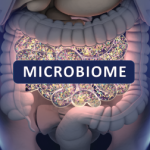“[Host] genes are, for the most part, non-modifiable,” Dr. Scher said. “The human microbiome is entirely modifiable,” with diet and antibiotics, by chronic diseases and by many other influences.
“What it means for translational medicine is that now you may have a way to take certain aspects of the microbiome and modify it in such a way that it’s either beneficial or prevents potential damage [from drugs used to treat rheumatic diseases],” he said.
Ongoing Research
In his lab, Dr. Scher and colleagues are putting these ideas to the test. Knowing that methotrexate requires certain enzymes to be polyglutamated, so it can become biologically active, they looked at baseline features of the microbiota of responders and non-responders to methotrexate.
The researchers found that if patients who were non-responders four months into treatment had significantly higher levels of the activating enzyme known as folylpolyglutamate synthase, the drug was essentially processed in the microbiome before it could be processed therapeutically. Using levels of the enzyme as a predictor has yielded a robust capacity for prediction of response. Results for 10 patients were encouraging, Dr. Scher said.
“Based on our model, can we categorize who’s going to be a responder?” he asked. “In every single case, we could predict whether or not they [would have a] low response or very high response.”
Armed with this knowledge, clinicians may be able to boost a patient’s response to treatment by incorporating microbes that may help guard against this premature metabolizing of the drug, allowing it to be properly absorbed.
Another approach being pursued is transplantation of fecal material from responders and non-responders into germ-free animals to determine whether responses can be manipulated. The goal is to try to improve upon the all-important goal of early response, Dr. Scher said.
“The whole idea now is to shift the field and try to use the microbiota in this precision medicine era,” he said. “It’s happening, and we are lucky that we have all of this science behind it.”
Now we can incorporate what we’ve learned into the treatment of rheumatic diseases.
Thomas R. Collins is a freelance writer living in South Florida.
References
- Scher J. The microbiome in psoriasis and psoriatic arthritis: Joints. J Rheumatol Suppl. 2018 Jun;94:32–35.
- Zhang M, Zhou Q, Dorfman RG, et al. Butyrate inhibits interleukin-17 and generates Tregs to ameliorate colorectal colitis in rats. BMC Gastroenterol. 2016 Jul 30;16(1):84.
- Smith PM, Howitt MR, Panikov N, et al. The microbial metabolites, short-chain fatty acids, regulate colonic Treg cell homeostasis. Science. 2013 Aug 2;341(6145):569–573.


